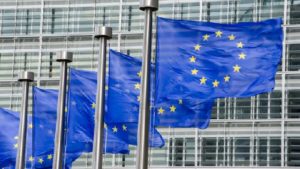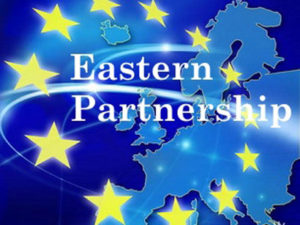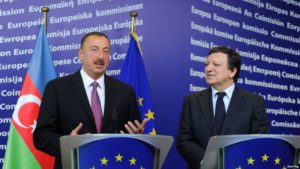Azerbaijan-EU relations within Eastern Partnership: new realities and current standing
 The Eastern Partnership program (EP) is a joint initiative involving the EU, its member states and 6 eastern European partners: Armenia, Azerbaijan, Belarus, Georgia, Moldova and Ukraine and is based on commitment to the principles of international law and fundamental values – democracy, the rule of law, human rights and fundamental freedoms. It also encompasses support for a market economy, sustainable development and good governance. The EU is seeking to build a close relationship with Azerbaijan toward gradual economic integration and a deepening of political cooperation. The relations between the European Union and Azerbaijan go back to the early 90’s. Following the Partnership & Cooperation Agreement that entered into force in 1999 the EU engaged further with Azerbaijan through its European Neighborhood Policy in 2003. The final step of the relations between Azerbaijan and the EU was the Eastern Partnership program that was signed in May 2009.
The Eastern Partnership program (EP) is a joint initiative involving the EU, its member states and 6 eastern European partners: Armenia, Azerbaijan, Belarus, Georgia, Moldova and Ukraine and is based on commitment to the principles of international law and fundamental values – democracy, the rule of law, human rights and fundamental freedoms. It also encompasses support for a market economy, sustainable development and good governance. The EU is seeking to build a close relationship with Azerbaijan toward gradual economic integration and a deepening of political cooperation. The relations between the European Union and Azerbaijan go back to the early 90’s. Following the Partnership & Cooperation Agreement that entered into force in 1999 the EU engaged further with Azerbaijan through its European Neighborhood Policy in 2003. The final step of the relations between Azerbaijan and the EU was the Eastern Partnership program that was signed in May 2009.
The EU is committed to building strong and mutually beneficial relations with all six partners, irrespective of their individual level of ambition in their relations with the EU, and Azerbaijan is not an exception in this regard. Azerbaijan has been a key player in the post- cold war South Caucasus and Caspian territory creating conditions for the Europe’s presence in the region. The country has made the West less dependent on oil and gas supplies from Russia. Moreover, Azerbaijan has been consistent in its energy supply and transportation diversification policy– being in an active collaboration with Ukraine, Belarus, Turkmenistan and Turkey to make energy and transportation projects plausible. Azerbaijan is also situated along the strategic crossroads and borders with Russia, Iran and Turkey – all significant players that influence the interests of the EU in the region. So far, Azerbaijan has been able to avoid direct conflict with any of these nations and demonstrate a balanced policy.
As already mentioned above, the EP opens new opportunities for the partner countries as well as Azerbaijan. The programme covers major key areas of cooperation: political association, economic integration and visa liberalization. It also upgrades the civil society’s status in the new programme through Civil Society Forum. In October 2015, reps of the Council of Europe and the European Union came up with several new projects to be implemented in Azerbaijan. They were and are aimed at increasing media freedom, building capabilities to combat corruption in state bodies, increasing the role of Judiciaries and training judges in Azerbaijan.
However, the relations ever since the signing of the EP have not been linear and unambiguous. The EU-Azerbaijan relations are in fact more tense at the moment. Major disagreements and dissatisfaction underlying the different areas are human rights, democracy and fundamental freedoms. The EU community has cast serious condemnations against the Azerbaijan government for their violation of human rights and jail of many of media and civil society reps. Anti-Azerbaijani rhetoric, inclinations and periodically adopted resolutions have driven a negative impact on the EP process, to which Baku has responded harshly, which could be characterized by a prejudiced intervention stating EU interference and media pressure to be a direct violation of the country’s sovereignty. The reaction by the Azerbaijani government to such resolutions and rhetoric was starkly severe and negative. The country has been determined enough and shown an unwavering will to even sometimes postpone the visit of the reps of the EU diplomatic services. Foreign minister of Azerbaijan – Elmar Mammadyarov while a press conference with his Turkish counterpart said: “Azerbaijan is an independent and sovereign country. There is no way a sovereign country could accept political pressure and dictate”. The speaker of the Azerbaijani parliament, Ogtay Asadov, attributed the pressure from the EU’s end on Baku to the country’s refusal to join sanctions against Russia, while Deputy Foreign Minister of Azerbaijan Mahmud Mammadguliyev assumed the Armenian lobby as well as other forces might stand behind such decisions of the EU.
Certainly, today the EU remains Azerbaijan’s main trading partner, accounting for 52 % of its trade turnover (EurActiv, March 6). And as an energy supplier Azerbaijan will continue to play a key strategic role in the future of Europe and its energy security. However, with reference to EU’s ambitions and scope and nature of its relations with its EP neighbors and notion to display a one-size-fits-all approach seriously needs to be reviewed taking into considerations the specifics of each single post-Soviet republic, as well as Azerbaijan and their old ties with Russia. A more tailored and pragmatic approach in relations with Azerbaijan would certainly help better reflect the current realities and Azerbaijan’s standing with the EU within the Eastern Partnership. And what we’ve seen is that Azerbaijan, in many ways, is not really keen or sincere towards being associated with the European Union. Therefore, as Azerbaijan’s ambassador to Belgium – F. Isgandarov argues the EU should employ a more carefully-calibrated approach and position towards Azerbaijan just to find a working middle ground while engaging with the country.
Referring to relations with post-Soviet Russia and its vital interests, it is certainly a tricky time for Azerbaijan in terms of its dealings with the European Union. And despite the EU’s success in broad neighborhood policy with Poland and other alike nations, Europe should be extremely cautious of provoking Russia since the EP countries, including Azerbaijan have been increasingly different in Russia’ eyes, especially given the results of the Riga summit (held in 2015) that called for an anti-Russian solidarity across the post-Soviet area. The recent critical developments such as the annexation of Crimea, an 8-day war in Georgia and the secession of Abkhazia and South Ossetia with direct support of Russia and further expansion ambitions of the latter prove that the EU should be tremendously wary of its policies it tries to pursue in the post-Soviet space.
Where does the future of the Eastern Partnership lead to?
A look at the general picture of where the Eastern Partnership stands now in relation to how much it has achieved its ambitions and targets so far gives a predicted sign of unsmooth progress of EP-Azerbaijan relations further. First of all, Azerbaijan (along with other countries) will inevitably face pressure from Moscow which may lead to a lack of progress in pre-determined political cooperation areas within the EP. Countries such as Azerbaijan, Armenia and Belarus have much stronger links to Russia compared to the other 3 countries, so the EU should be, wherever and whenever possible, avoid to push these countries back to Russia’s arms. Notably, Azerbaijan is the only EP country which has neither joined an EP Association Agreement nor entered Russian-led Eurasian Union. Armenia and Belarus have already signed to join the Custom’s Union agreement and joined Eurasian Union initiated and led by Russia. From this perspective, the EU needs to place special emphasis and take a special course in relation to Azerbaijan. But very broadly, if the EU finds ways to start effectively cooperating with these countries, it should go without hurting Russia and posing a danger to its vital interests, as outlined in a key Riga Summit paragraph which says “the participants of the summit stress that the Eastern Partnership aims at building a common area of shared democracy, prosperity, stability and increased cooperation and is not directed at anyone.” It also adds: “In this context, the summit participants express their readiness to help overcome the worst political rift in Europe since the end of the Cold War. Our citizens expect us to prevent further negative repercussions for the stability of our continent and we are committed to do so.” The EU’s offering a cooperation to Russia in some workable format (effectively of the same essence/nature as with that of the Eastern Partnership) would potentially make Russia less demanding and less offensive.
Secondly, Azerbaijan (together with Armenia and Belarus) which have not yet signed association agreements with the EU, and the drafts are only about a much needed increased cooperation without stipulating what that increased cooperation will contain. So, the EU should define a clearer format of cooperation in the near future and apply an individual approach in the relation to Azerbaijan taking into account the characteristics of the country.
Thirdly, the future success of EU-Azerbaijan EP program and expected autumn negotiations will heavily depend on the European stance on human rights and media freedom issues. Not surprisingly, the Riga summit conclusion on Azerbaijan was the statement from the EU that “the negotiations for a Strategic Partnership Agreement with Azerbaijan should be immediately put on hold as long as the government fails to take concrete steps in advancing respect for universal human rights”. After the resolution was adopted, Azerbaijan suspended its participation in the Eastern Partnership. As Head of the Presidential Administration of Azerbaijan Republic – Ramiz Mehdiyev says “the EP has brought disappointment for Azerbaijan”. He also adds “the EU Parliament’s interference and intrusion in human rights and other affairs are both inappropriate and counterproductive. Human rights issue can’t be used as a tool of pressure against the government. Azerbaijan will look forward to further strengthening the relations and cooperation within the EP as long as these relations are based on mutual trust, respect and non-interference in affairs of Azerbaijan”. One could argue that the EU is also somehow blame for backsliding and deterioration with the current level of human rights, media freedom and other fundamental freedoms in Azerbaijan. The EU has periodically overlooked and compromised these principles in Azerbaijan due to its energy security that has trumped human rights. The bad news is that the civil society is usually excluded from the official EU-Azerbaijan bilateral talks leaving the needs of the wider population aside. So, the EU would potentially seek additional ways on how to channel the institutional funds to the civil society to address the imbalances caused by the oil based economy.
Further, to hold Azerbaijan closer, the EU has to offer the country unavoidably positive incentives such as visa-free regime or visa liberalization, etc., which the EU has even decided to postpone for Ukraine and Georgia, which means the door is still not open and the Partnership program is not entirely sincere as outlined in the Joint Action plan. And finally, there should be a much greater involvement in the settlement of the Nagorno Karabagh conflict in order to win Azerbaijan’s trust and also make the EP multilateral track work.
The article is published thanks to The Council of State Support to Non-Governmental Organizations under the Auspices of the President of the Republic of Azerbaijan.